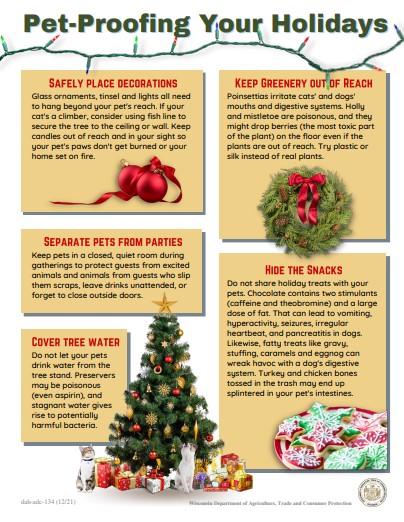The holidays can be hard on pets. They can create hazards throughout your home and fuel stress and anxiety. That is why it’s important that pet owners put as much thought into their pet’s safety as they do with their holiday gatherings.
There are several precautions pet owners can take to protect their animal companions. DATCP offers these tips and fact sheets to help keep your pets safe and stress-free.
Pet-Proofing Your Holidays

The holiday season strains your nerves and digestive system. Just imagine how all that excitement can elicit a wide range of emotions with your pets.
See DATCP's
Pet Proofing your Holidays flyer. State humane officer Dr. Yvonne Bellay offers these additional tips for the holiday season:
Best practices:
- Keep your pets on their regular feeding, walking, and play schedule; animals do best with routine.
- Pet-proof your decorations. Glass ornaments that could cut tongues and paws, tinsel and angel hair that can block digestive systems, and lights on chewy electrical cords all need to hang beyond your pet's reach. If your cat's a climber, tie the Christmas tree with fish line to a hook in the ceiling or to a wall stud. Keep candles out of reach and in your sight so their paws don't get burned or your home set on fire.
- Keep your pets in a closed, quiet room during parties to protect guests from over-excited animals and animals from guests who slip them scraps, leave drinks unattended, forget to close outside doors, or step on unwary ferrets.
- Treat pets with dog biscuits or catnip toys instead of people treats.
- Keep seasonal greenery out of reach. Poinsettias irritate cats' and dogs' mouths and digestive systems. Holly and mistletoe are poisonous and might drop berries (the most toxic part of the plant) on the floor even if the plants themselves are out of reach. Try plastic or silk instead of real plants.
Things to avoid:
- Do not let your pets drink water from the Christmas tree stand. Preservers may be poisonous (even aspirin), and stagnant water gives rise to potentially harmful bacteria.
- Avoid sharing holiday treats with your pets, no matter how sad their faces. Chocolate is a triple threat, with two stimulants (caffeine and theobromine) and a not-so-healthy dose of fat which adds up to vomiting, hyperactivity, seizures, irregular heartbeat, and pancreatitis in dogs. Likewise, all those other fatty treats like gravy, stuffing, caramels, and eggnog can wreak havoc on a dog's digestive system. Turkey and chicken bones tossed in the trash may end up splintered in your pet's intestines.
- Do not give alcohol to pets — it is a toxin.
Giving a Pet as a Gift
Buying someone a puppy or kitten as a Christmas gift may seem like a good idea at the time, but by February animal shelters are overwhelmed with pets that were given up by their owners. DATCP state humane officer Dr. Yvonne Bellay says pet owners must choose to be better owners, and they must choose pets that match their lives and temperaments.
Consider the following:
- Pets should never be impulse purchases. Getting a pet must be a choice — and a commitment — made by the person who will care for the pet.
- The holidays are the worst possible time to introduce a pet into the household; there is too much confusion, too little routine, too many strangers, and too many temptations that are bad for animals. If you've discussed and planned the gift with the recipient, settle for a photo, collar, supplies, or some other stand-in for the pet itself. Wait until life settles down in January to introduce the pet into its new home.
- Assuming you and the pet recipient have discussed and planned the gift, do the research. What kind of pet will fit into the recipient's life? A dog, a cat, a ferret? What breed of dog or cat? Be realistic about exercise, grooming, need for attention, and the potential for veterinary bills.
- When you've decided on a type of pet, consider adopting an animal from your local shelter. If you want a purebred, go to a reputable breeder. Look at the breeder's facilities. Get guarantees in writing and read them carefully before you take the animal home. If the breeder says the animal is registered, don't go home without papers in hand.
— Back to top —
Buying Gifts for your Pets
Chances are your ideas for a great pet gift do not align with your pet's wish list. There are two rules
of thumb when you're searching for gifts for pets. First, remember that animals chew and swallow almost anything. Second, don't assume that every item on the
pet store shelf must be safe.
Here are some tips:
- Keep the gift size appropriate. For example, small chew bones for a big dog might go down in one gulp, or be bitten into tiny splinters that the dog swallows.
- Toys with small parts are as dangerous for your pets as they are for your toddlers. Those little wind-up mice that you find so entertaining may break apart in one good pounce and end up in your pet's digestive system.
- String and cats do not mix, contrary to popular belief. Cats can swallow string, which eventually may catch in their intestines and tug them into accordion folds.
- Be aware of the materials in any pet toy. Be sure there are no toxins.
- Know your pet. A stuffed animal might be a wonderful toy for a gentle dog, but a hazard to a dog or a ferret with a chewing habit. The sock that one dog uses for tug-of-war might become a digestive obstruction in another dog.
— Back to top —